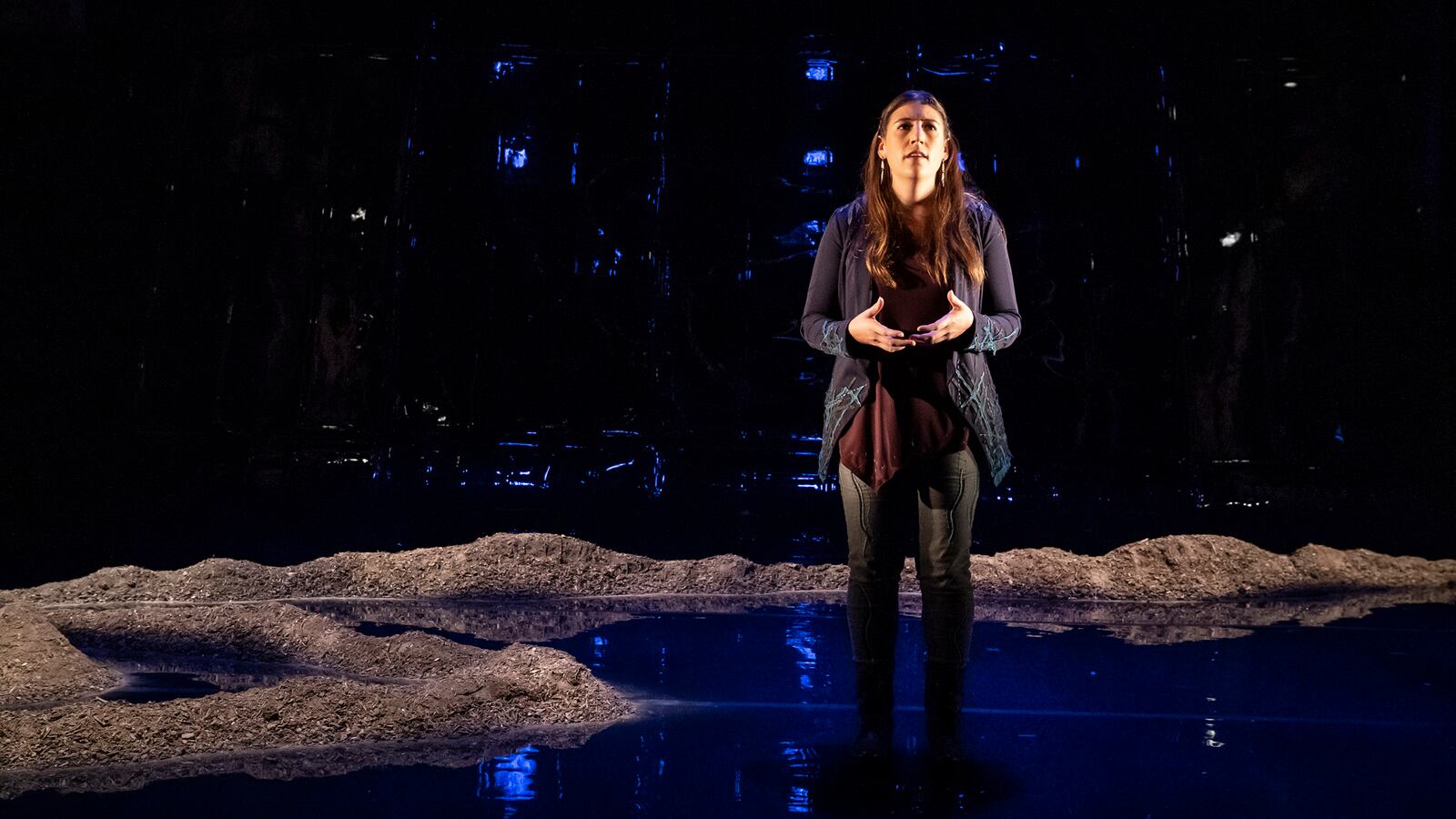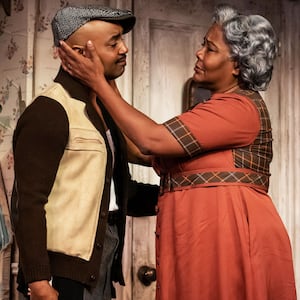Where We Belong
Madeline Sayet is a solitary storyteller who feels surrounded by multitudes in Where We Belong—a beautifully written, spoken, and staged 80-minute piece of theater that opens tonight at the Public Theater (to November 27). Designed with subtle stunning by Hao Bai and directed by Mei Ann Teo, Mohegan theater-maker Sayet tells a story of lines, borders, and boundaries, of cultural evolution and cultural erasure, the lands we are from and the lands we travel to, shifting identities, and shifting histories.
This funny, inquiring, and moving journey of discovery around her own Native American identity and cultural history occurs alongside a physical journey she takes to England to study for a Ph.D. in Shakespeare, and this at the time of Brexit, and what the means for a country like Britain—to turn inwards, to isolate, to become poisoned and poisonous to newcomers.
For Sayet, Britain and America are also colonizers; they have done damage to her Native American people, without apology and without care—in the play, she recites one trip to the British Museum where a guide speaks with a kind of blithe disregard when it comes to not just ownership and provenance of the artifacts the museum holds, but a much more chilling insensitivity and callous ignorance to the human flesh it holds.
The power and pride Sayet feels come from her native ancestors, and their wit, ingenuity, bravery, and fortitude. The stage is designed with little raised outcrops to signify physical land masses, and also moments where Sayet asks herself how can she traverse a particular personal question. We follow her through customs checks at airports, where the matter of who she is and where she is going is always thrown into bluntly sharp relief. She has always loved travel, even if she was named after a dead bird and she was terrified of death-by-flying as a kid, having seen the first Final Destination movie.
Asked directly by a customs officer how she would have voted in the Brexit referendum, she says, “Remain.” The officer smiles at her. “I’m relieved because I agreed with the right side, the safe side in this particular instance. But the safe side is different. Depending on which line you are trying to cross. Today the word remain means togetherness, tomorrow it could mean apart.” With Brexit and the election of Trump, Sayet says, “America and England have revealed their roots. They do not believe all people are created equal, they never have. Borders get more and more intense.”
Sayet reveals a love of Shakespeare, and also her mom’s challenge to why she is crossing an ocean to study “a white man.” She tells a rich and fascinating story of Mohegan culture and history, of its inspirational figures, and of beloved family members. Her mission is to ensure that it is “always being spoken. Somewhere. That it’s never really a dead language. That our ancestors still hear it every so often, and you remember the ground on which you are standing. My mom taught me in the Mohegan language you can leave your nation, but you can no more leave the land from which you are from than you can your leg. There’s no words for that, the place you are from is physically a part of you.”
We feel that keenly by the end of Where We Belong. Sayet is proud to travel, she is happy to cross borders of all kinds: “I’m a Shakespearean and I can teach contemporary Native Drama too, and we can discuss what they have to say to each other.” Sayet is also proud of not just who she is and where she is from, but emphatic that audiences should understand cultural presence and respect. A sense of belonging does not just come from within, she shows, but also from claiming space in the world, of reminding a dominant order of its trespasses, and of reminding us all to travel and tread across boundaries near and far with more knowledge, awareness, and understanding.

Catch as Catch Can.
Joan MarcusCatch as Catch Can
Mia Chung’s Catch as Catch Can (Playwrights Horizons, to Nov 20) is also about identity and different kinds of erasure, with the tangled fortunes of two families in blue-collar New England, some illicit passions, and other unspoken feelings thrown in too. It is distinguished by the sterling performances of its three actors—Cindy Cheung, Jon Norman Schneider, and Rob Yang—who are actors of color taking on a dizzying array of roles of white parents and children, traversing race, ages, and genders with both hilarity and sensitivity.
Meet the Italian American Levecchias of blue-collar New England; Chung plays dad Lon, in his 70s, and daughter Daniela, in her late 30s. Yang plays mom Roberta in her late 60s, and their son Robbie, in his mid 40s. Schneider inhabits both Theresa Phelan, in her late 60s, and her son Tim, in his mid 40s. Tim is the play’s most damaged character, a young man with big, life- and sanity-endangering problems. The doubling of characters is integral to the play, its impact, and its meanings.
Yang and Schneider, to greater comic effect, play Theresa and Roberta, bitching, laughing, joking, chiding, organizing, with vowels and consonants marinaded perfectly in the area they call home. The play opens with Theresa and Roberta imagining Theresa’s imminent trip to England, and a mulling of the merits of royals past and present: Diana, Kate, and Meghan. Soon, as their gossip intensifies, casual racism and ignorance issue forth.
At almost two intermission-less hours in a small theatrical space, the play can drag, or feel too hemmed in and confusing. An intermission might help, and so might a different mode of pacing. The humor of the piece—the moms are trying to organize a party with the right sauce and drinks and food, bustling this way and that with trays and bottles and cups and various criticism and cattiness—is a thematic world away from Tim’s far graver problems, and although the actors transition between characters and moods deftly, the writing can sometimes feel puzzling or tonally jagged in the transitions. The play’s final scene is beautifully executed—an extended emotional gut-punch between two sons on two very different life roads.







